Given a time-domain recurrence equation (such as the one you quoted from wikipedia), the corresponding transfer function in the z-domain can relatively easily be obtained by using the following properties:
![$$\begin{align} \mathcal Z\left{x[n-k]\right} &= z^{-k} X(z) \tag{1}\ H(z) &= \frac{Y(z)}{X(z)} \tag{2}\end{align}$$](../../images/3794275401.webp)
Where X(z) and Y(z) are the z-transforms of the time-domain input sequence x and output sequence y respectively.
Going the other way around, given a transfer function which can be expressed as a ratio of polynomials in z, such as:

the recurrence equation of the transfer function can be written as:
![y[n] = -\sum_{i=1}^M a_i y[n-i] + \sum_{i=0}^N b_i x[n-i]](../../images/3825798271.webp)
There are of course many different ways to implement such a recurrence equation, but a simple filter implementation following the Direct Form II would be along the line of:
// Implementation of an Infinite Impulse Response (IIR) filter
// with recurrence equation:
// y[n] = -\sum_{i=1}^M a_i y[n-i] + \sum_{i=0}^N b_i x[n-i]
public class IIRFilter {
public IIRFilter(float a_[], float b_[]) {
// initialize memory elements
int N = Math.max(a_.length, b_.length);
memory = new float[N-1];
for (int i = 0; i < memory.length; i++) {
memory[i] = 0.0f;
}
// copy filter coefficients
a = new float[N];
int i = 0;
for (; i < a_.length; i++) {
a[i] = a_[i];
}
for (; i < N; i++) {
a[i] = 0.0f;
}
b = new float[N];
i = 0;
for (; i < b_.length; i++) {
b[i] = b_[i];
}
for (; i < N; i++) {
b[i] = 0.0f;
}
}
// Filter samples from input buffer, and store result in output buffer.
// Implementation based on Direct Form II.
// Works similar to matlab's "output = filter(b,a,input)" command
public void process(float input[], float output[]) {
for (int i = 0; i < input.length; i++) {
float in = input[i];
float out = 0.0f;
for (int j = memory.length-1; j >= 0; j--) {
in -= a[j+1] * memory[j];
out += b[j+1] * memory[j];
}
out += b[0] * in;
output[i] = out;
// shift memory
for (int j = memory.length-1; j > 0; j--) {
memory[j] = memory[j - 1];
}
memory[0] = in;
}
}
private float[] a;
private float[] b;
private float[] memory;
}
which you could use to implement your specific transfer function like so:
float g = 1.0f/32.0f; // overall filter gain
float[] a = {1, -2, 1};
float[] b = {g, 0, 0, 0, 0, 0, -2*g, 0, 0, 0, 0, 0, g};
IIRFilter filter = new IIRFilter(a, b);
filter.process(input, output);
Note that you can alternatively also factorize the numerator and denominator into 2nd order polynomials and obtain a cascade of 2nd order filters (known as biquad filters).

![$$\begin{align} \mathcal Z\left{x[n-k]\right} &= z^{-k} X(z) \tag{1}\ H(z) &= \frac{Y(z)}{X(z)} \tag{2}\end{align}$$](../../images/3794275401.webp)

![y[n] = -\sum_{i=1}^M a_i y[n-i] + \sum_{i=0}^N b_i x[n-i]](../../images/3825798271.webp)